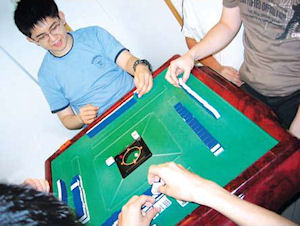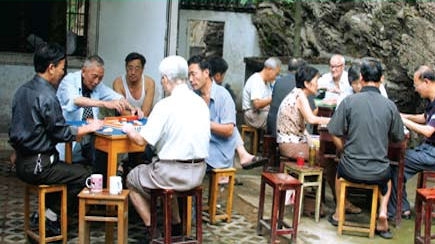This article first appeared in the May/Jun 2010 issue of World Gaming magazine.
Mahjong is more than just a game. For most families in China it is a way to connect all generations. In Japan it is a way to bond with your coworkers or even clients. The culture and setting of mahjong might vary from country to country and culture to culture, but every player has a story and a special bond with this game.
Jenn
I was introduced to mahjong during my final year in uni. It was a welcome distraction from my mundane slot machine habit. While I love the excitement of gambling, I’ve always been more interested in games of skill with real pieces than the loud dings and flashing lights of the money-eating machines.

I came to Japan when I was 18 and when I learned mahjong I spent most of my time alone. I needed an escape, something to concentrate on, that would let me forget everything around me. I found that in these tiles. I could spend hours with my friends or with strangers, just concentrating on my hands and the Chinese engravings.
My favourite mahjong player, Takeo Kojima says that the mahjong table is like a battlefield. There are tactics and strategy and experience often wins out, but you can’t win without luck.
The best thing about mahjong is the camaraderie. On the table you’re foes and at war, but when the game is over it’s time for drinks and often the winner is picking up most of the tab. Mahjong is the best of all worlds and travels over borders. Next time you start a game, look around at your friends, think about how happy you are that they are there with you, then crush them!
Puyo
Many people in Hong Kong learned mahjong when they were in primary school. I am also an example, and I actually learnt it from video games.

I love playing chess and solving puzzles, and every mahjong game is just like one of them. You really need to plan your strategy and think ahead in order to play well.
Winning a game of mahjong, like solving a puzzle or winning a chess game, gives me a great deal of satisfaction, which is incomparably more important than any small amount of money I might win.
I love Japanese style mahjong most, but there are not enough players in my neighbourhood so I usually play it on the internet, where I can play and quit any time I want. The internet also gives me a chance to play with strong opponents, and I started to investigate strategies to improve myself. Before long I found an article which dealt with mahjong strategy using a mathematical and analytical approach. When I discovered this, I was shocked, but now my current strategy comes from this approach.







